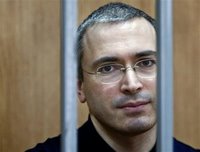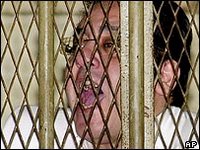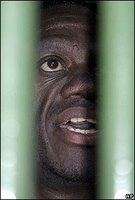Of course, some of us remember well how, during the Cold War, imprisoned political dissidents like Natan Sharansky (in Russia) Aung San Suu Kyi (in Myanmar) and Nelson Mandela (in South Africa) were causes celebres for political activists around the world. (I certainly participated in my share of “Free Mandela – End Apartheid” rallies in college.) But even western governments seemed unrestrained by diplomatic protocol as they spewed moral indignation at the totalitarian regimes that jailed these martyrs for democracy.
Therefore, it is more than a little ironic that – despite the wave of democracy washing over the world – there are more political dissidents in prison today than there were back then. (And, in its oxymoronic attempt to keep a leash on political freedoms as it unleashes free enterprise, China probably has more political dissidents behind bars than all other countries combined….) But it is profoundly disheartening that neither political activists nor western governments seem terribly troubled by the plight of these victims of political oppression.
Indeed, agitation on behalf of the politically oppressed appears to have fallen out of fashion along with greasy jerry curls and disco music….
Nevertheless, for overindulged college students who are conscientious enough to appreciate that there’s more to extra-curricular activities than cruising My Space, here’s a little collegial advice: Research the high-profile dissidents featured below (or any others you deem worthy), then organize campus freedom rallies for their cause. I guarantee that you will not only become a better student (and human being) for doing so but, in due course, you will also rekindle widespread moral outrage against the repression of political prisoners – just as rallies for clemency for Stanley “Tookie” Williams rekindled outrage against the death penalty. (And Gov. Arnold Schwarzenegger found out just how influential such protests can be when his native Austria rebuked him – by revoking his national honours – after he signed Tookie’s execution order).
 Political prisoner Mikhail Khordokovsky
Political prisoner Mikhail Khordokovsky
As if to dramatize his zero tolerance of political dissent, Russian President Vladimir Putin – the man President Bush lauded for having a good democratic soul – decided to make an example of the richest man in Russia (who, not insignificantly, is also a Jew). As a result, one day in October 2003, Mikhail Khodorkovsky went from running one of Russia’s most profitable companies and funding democratic reform campaigns, to being arrested and thrown in prison on charges of fraud and tax evasion. Khodorkovsky is now serving a 9-year sentence, no doubt in a dingy cell in the infamous Russian Gulag Archipelago).
Western leaders still consider Egyptian President Hosni Mubarak a pioneer for democracy in the Arab world – despite the fact that during his 25 years in power he never allowed a single candidate to oppose his “re-election” as president. But it was only this year – when democratic reforms in Iraq and Palestine made him look like the dictatorial dinosaur he is – that Mubarak deigned to “ask his country’s parliament to change the constitution and permit multiparty popular elections.”
Yet, even as he made this request last February, Mubarak had already begun his campaign of repression against his most formidable opponent Ayman Nour. Nonetheless, Nour’s Tomorrow Party made a relatively respectable showing in the September national elections by winning 12% of the vote against 89% for Mubarak’s egregiously misnamed National Democratic Party (down significantly from its customary 100%).
But, evidently, Mubarak found this prima facie fraudulent margin of victory too unnerving. Because just this week, his rubber stamp judiciary found Nour guilty of those stale charges and sentenced him to 5 years in prison (which, in a truly Machiavellian bit of political stagecraft, means that Nour will be out just in time to serve as Mubarak’s foil for his next round of multiparty elections.)
Political prisoner Kizza Besigye
Uganda’s President Yoweri Museveni is no more a democratic pioneer in Africa than Egypt’s Hosni Mubarak is in the Middle East. Yet Western leaders routinely lavish Museveni with praise for his democratic leadership.
In “Another Commonwealth Summit on Trade Ends with Imperial Promises but no Guarantees,” November 29, 2005, I noted with derision that:
“Delegates spent almost as much time defending their decision to allow Uganda’s President Yoweri Museveni to host their next summit, as they did spinning the platitudes about trade and good governance contained in their joint Communiqué into something approximating substantive achievement.”
Except that their decision was indefensible. Because, only weeks before this summit, Museveni had opposition leader Kizza Besigye arrested on a battery of charges ranging from terrorism to rape. More to the point, these Commonwealth leaders knew full well that Museveni timed Besigye’s arrest to prevent him from running in national elections scheduled for next February.
Yet they not only refused to censure Museveni; they reaffirmed their intent to allow him to host their summit in 2007. The damning irony of treating his re-election as a fait accompli seemed completely lost on them.
So, where’s the outrage?
College students of today, it’s time to find your Nelson Mandela, put away your ipods and protest…goddamn it!
News and Politics

